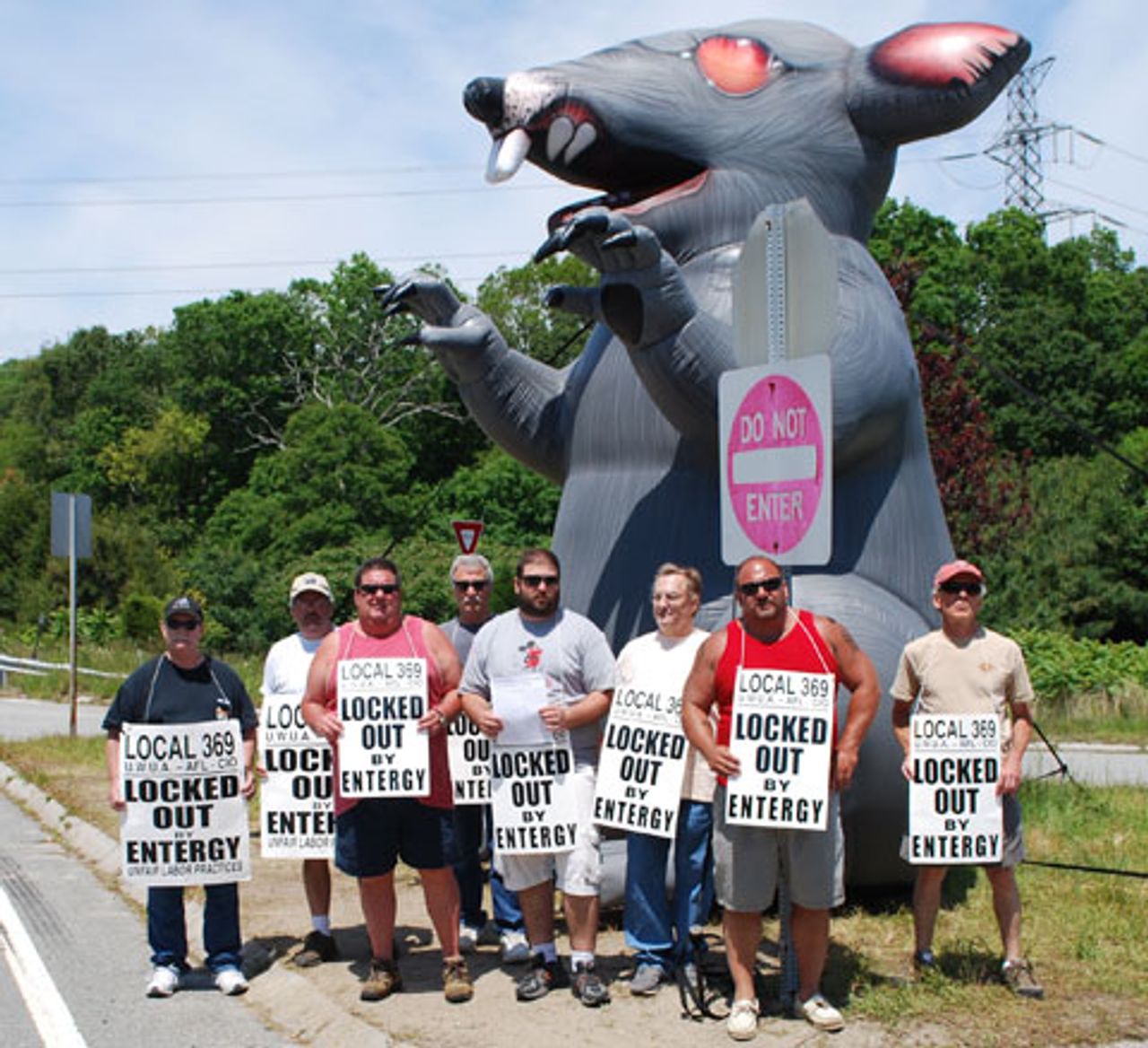Entergy New Orleans has a legal monopoly: the corporation has an agreement with the City that it is the only entity with rights to provide electricity + gas to New Orleans residents, as long as its profits are regulated by the NO City Council. Many utility providers have legal monopolies, partially because of the impracticality of 10 different companies' high-voltage lines + transformers running down your street. Entergy NO is 100% owned by Entergy Corporation, NO's only Fortune 500 company.
Entergy just applied for a rate increase, before their Integrated Resource Plan gets decided on by City Council. Lots of folks are heated, as usual.
 |
| Entergy workers picketing in Mass |
So what is the basis that NO City Council uses for "justifiable rates" by Entergy? Federal Power Commission v. Hope Natural Gas Co. (1944) was a landmark case for how the governing bodies can regulate resources that most everyone relies upon. Up to this point, the government courts used a formula to determine if utility rates were justifiable, based on what it took to actually get the utility to the customer*. The Hope case, as I understand it, made rates not only consider the past tense of the utility (what had to be done to provide service) but brought planning of resource use + allocation into the picture by also thinking about the future of the utility, by mention of investors**. So now its a battle: "The Hope test requires courts to examine the balance struck by the ratemaking authority between the competing interests of utility investors and consumers."*** There you have it, open admission by Supreme Court that investors' interests are in opposition to those they "serve."
As a result of the 5th amendment's "takings clause" (no private property taken by government for public purpose without just compensation -- see early FTB classes + related issues of "what is public purpose these days?"), individual investors cannot be held liable for losses of a company they have ownership in. In the case of Entergy New Orleans, it is owned by a single investor, Entergy Corporation. Even though Entergy Corp raked in millions (aside from other huge available funding sources^), it still used the takings clause as an excuse to raise the bills for New Orleanians after Katrina to repair the infrastructure.
"What about all the profits that flowed up to the parent company in previous years?" he asked. In many instances, utilities will go to a regulatory body to ask for a rate increase when their profits are down, but if they make a greater-than-expected return, they don't ask for rates to be lowered, he said.
*the factors taken into account with a "just" rate originate vaguely in Smith v Ames (1898):
"the original cost of construction... the amount and market value of its bongs and stock... the present as compared with the original cost of construction, the probable earning capacity of the property under particular rates prescribed by statute, are to be given such weight as to be just and right in each case"**after a meteor impacted our atmosphere last Friday just above a Russian town, its force shattered glass in 300 or so buildings, injuring 1000 people. This brought discussions of "is this a new weapon being tested by the Americans?" and "what will we do to prevent this from happening again?" What would a meteor-defense-shield be? Drones armed and floating above, waiting centuries for some unfamiliar thing to be blasted? NASA's response: "funding will determine how this takes shape."
***way dense report on history of gov't regulatory powers over utilities + how investment interest plays in. from Fordam Law Review
^see the current situation on Broad St for crazy money allocation stories... While areas of town such as the Lower 9 sit without any immediate grocer access, Midcity is drowning: within a mile from the existing Rouses and planned Winn Dixie across the street, Whole Foods is being paid by to open shop. They are doing this with $1 million funding marked for putting fresh food in "food deserts" (3 supermarkets?!?!!), as well as $900,000 from New Orleans Redevelopment Authority (who works to remedy blight, though they own sit on thousands of old Road Home properties, empty and overgrown, a "land bank"), via Broad Community Connections, who work to heighten the commercial-corridor-placemaking-attractiveness of Broad St.
| Old Schwegmann's, new Whole Foods: the rooftop is a parking deck that has held free concerts, then pay-to-enter movies, and now... ? |
Now I know lots of people think eating out of a garden is gross (really.), but fresh food is amazing. Especially if its actually for everyone. I guess one way to "remedy blight" is to put in a retailer such as Whole Foods, where many people simply cannot afford to shop: an amazing neighborhood (where, I must add, I reside, and its residents are already dealing with issues of gentrification and racial divide) becomes even more attractive to outsiders, houses get bought up, old tenants move out, rent prices get hiked, more multifaceted stories of urban migration patterns led by where the next affordable neighborhood to market + exploit lies. But is remedying blight to be favored over folks having security of longevity in their homes or proximity to friends, family, and resources that help them live there lives?